A student recruitment CRM helps colleges and universities manage inquiries, track leads, and automate communication across multiple channels. By centralizing student data and providing actionable insights, these systems make recruitment more efficient, personalized, and data-driven, ultimately boosting enrollment and enhancing the overall admissions process.
Table Of Contents
Introduction
In today’s competitive educational landscape, institutions need efficient tools to attract, engage, and enroll students. Higher education recruitment software has become essential for managing complex recruitment processes and improving student engagement.
The global market for this software was valued at USD 2.82 billion in 2024 and is projected to reach USD 3.26 billion in 2025, eventually growing to USD 10.35 billion by 2033, with a CAGR of 15.56% between 2025 and 2033. This growth shows that colleges and universities are increasingly using recruitment software to simplify admissions, increase enrollment, and make smarter decisions.
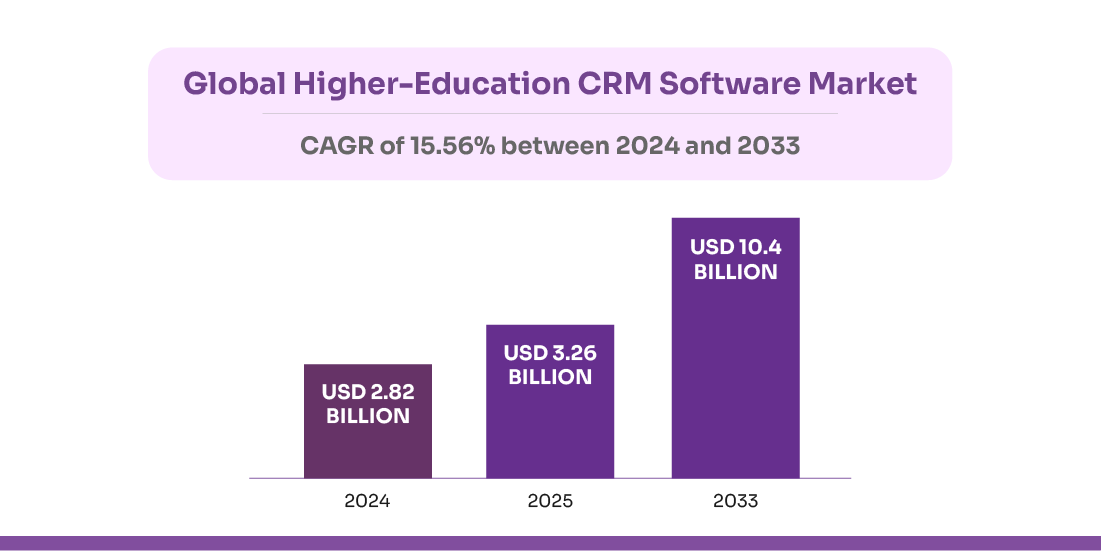
What is a Student Recruitment CRM?
A student recruitment CRM is a platform that centralizes student data and communications in one place, helping institutions manage marketing campaigns and recruitment processes more efficiently. These systems automate workflows, deliver personalized campaign materials, and track interactions across multiple channels, making recruitment faster and more effective.
Designed for integration with other tools like event management software and student information systems, this CRM offers real-time insights into the entire student journey—from initial inquiry to enrollment—allowing institutions to make data-driven decisions and enhance student engagement.
Do You Really Need a CRM for Your Educational Institution?
In today’s digital world, students expect fast and seamless communication across multiple channels. A student recruitment CRM helps educational institutions meet these expectations by streamlining admissions, boosting student engagement, and improving overall operational efficiency, making it a must-have tool for institutions of any size or type.
Streamline Student Enrollment
Onboarding new students can be complex—especially when multiple departments and campuses are involved. Errors in collecting contact details or assigning leads can result in missed opportunities.
A robust CRM simplifies the process by:
- Assigning leads to the right enrollment officers
- Ensuring accurate data collection
- Organizing student information systematically
This is particularly valuable for institutions managing hundreds of enrollments or operating across multiple locations. In fact, over 25% of U.S. higher education institutions have already adopted a modern advancement CRM to replace legacy systems, according to Tambellini research.
Improve Communication with Students and Staff
Managing communication with large student populations is challenging without an efficient system. Poor processes can lead to delayed messages, miscommunication, or targeting the wrong audience.
A CRM improves communication by:
- Enabling personalized and targeted messaging
- Automating follow-ups and communication sequences
- Scheduling meetings or calls once prospects engage
Track Institutional Progress
Measuring success is impossible without accurate data. Without a centralized system for tracking and reporting, institutions can’t reliably assess their enrollment strategies.
A CRM supports this by:
- Tracking student data and institutional metrics
- Producing performance benchmark reports
- Delivering insights to guide strategic decisions
68% of U.S. higher-ed CTOs prioritize leveraging data for student success, and with more institutions adopting unified data models, the opportunity to enhance analytical capabilities is rapidly growing.
Manage Fee Payments and Reminders
Tracking student payments can be hectic, especially when multiple payment methods are involved. A CRM helps institutions:
- Monitor payments for courses and modules
- Track progress toward financial targets
- Generate fee statements and send automated reminders
Measure Marketing Performance
Understanding which marketing efforts drive enrollment is essential. A CRM allows you to:
- Identify your most successful marketing channels
- Track ad spend and return on investment (ROI)
- Attribute student enrollment to specific campaigns or platforms
On average, the cost per inquiry in U.S. higher education is $128 for undergraduates and $157 for graduate students.
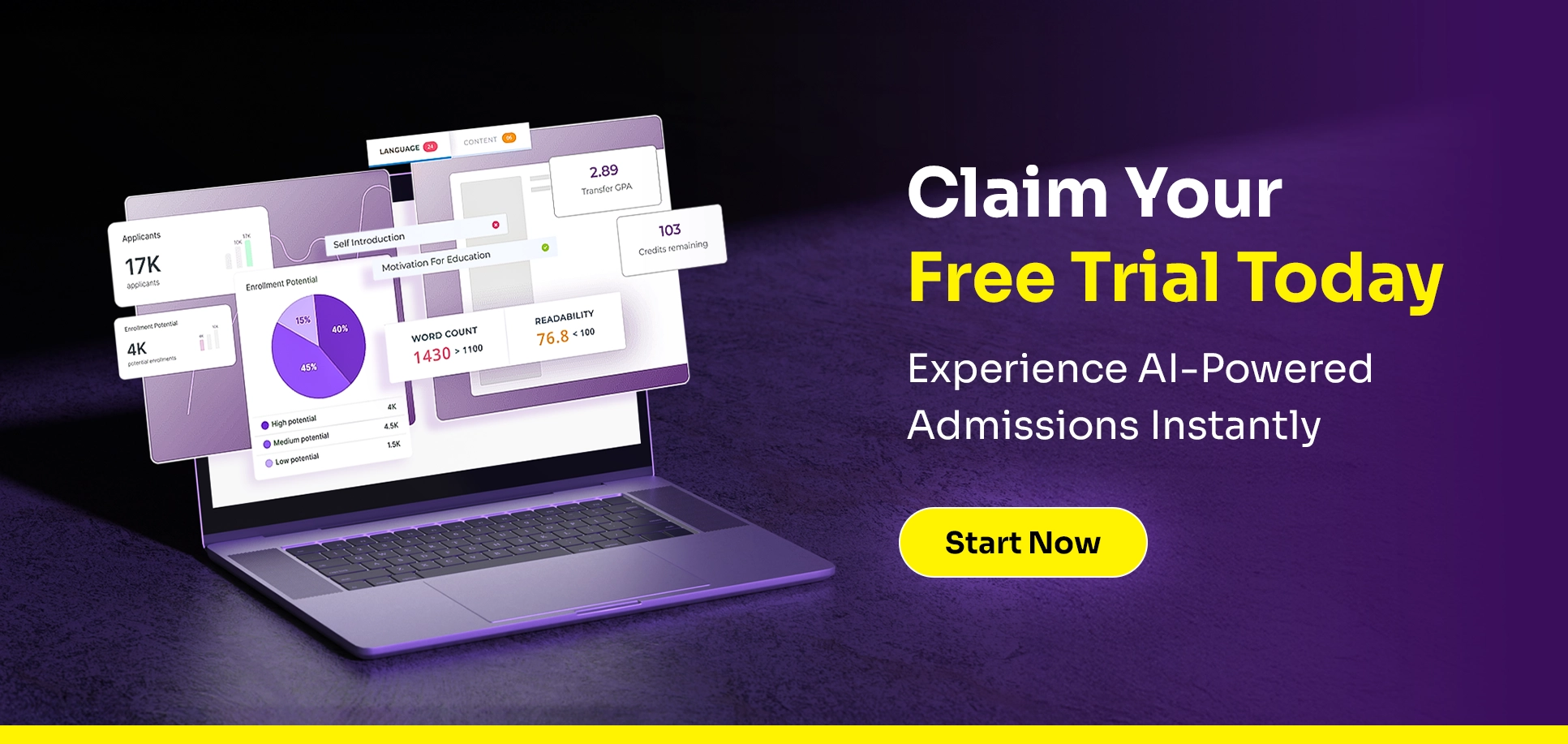
How Education Recruitment Software Can Help Your Institution Grow
A student recruitment CRM is more than just a contact database — it’s a central platform that helps schools and universities organize student records, respond to inquiries quickly, boost admissions, and improve teamwork. Here’s how it can drive growth and efficiency for your institution:
Better Record-Keeping and Accurate Data
A CRM stores all prospective student information in one secure place, allowing admissions teams to access data quickly and track each student’s journey. This ensures clear communication and helps identify the most promising leads. For instance, the University of California recorded 299,407 enrollments in Fall 2024, a scale that demands accurate, centralized systems to avoid mistakes.
Faster Response to Student Inquiries
Managing large volumes of student questions becomes easier with a CRM. Staff can use pre-set replies for common queries, assign inquiries to the right team members, and schedule calls or meetings directly through the system. According to a 2024 EDUCAUSE survey, 66% of U.S. higher-ed CIOs face challenges with siloed systems, which slow down communication and responses.
Increased Admissions Through Targeted Recruitment
CRMs analyze lead sources to identify which marketing channels deliver the best results, allowing institutions to focus resources efficiently. Built-in marketing automation tools enable coordinated campaigns across email, social media, and other platforms. A Forrester study found that cloud-based CRM adoption can increase enrollment by up to 11%, improve student retention by 15%, and boost fundraising by 10%.
Seamless Integration With Other Tools
Modern CRMs integrate with student information systems, email marketing software, and social media channels, eliminating the need to switch between multiple applications. This keeps recruitment work organized and efficient. For example, Hennepin Technical College reported a 10% increase in new student enrollment after implementing a CRM.
Enhanced Team Collaboration
CRMs make it easier for departments to work together by providing shared content repositories and centralized access to student data. Mobile-friendly CRMs allow staff to log in from phones or tablets, keeping processes flexible and enabling quick action on the go.
Data-Driven Decision-Making
CRMs offer reporting tools that track admissions performance, campaign success, student engagement, and retention trends. These insights help leadership identify strengths, address weaknesses, and make informed decisions. No wonder 88% of U.S. higher education institutions already use CRMs for admissions and recruitment they are essential tools for institutional growth.
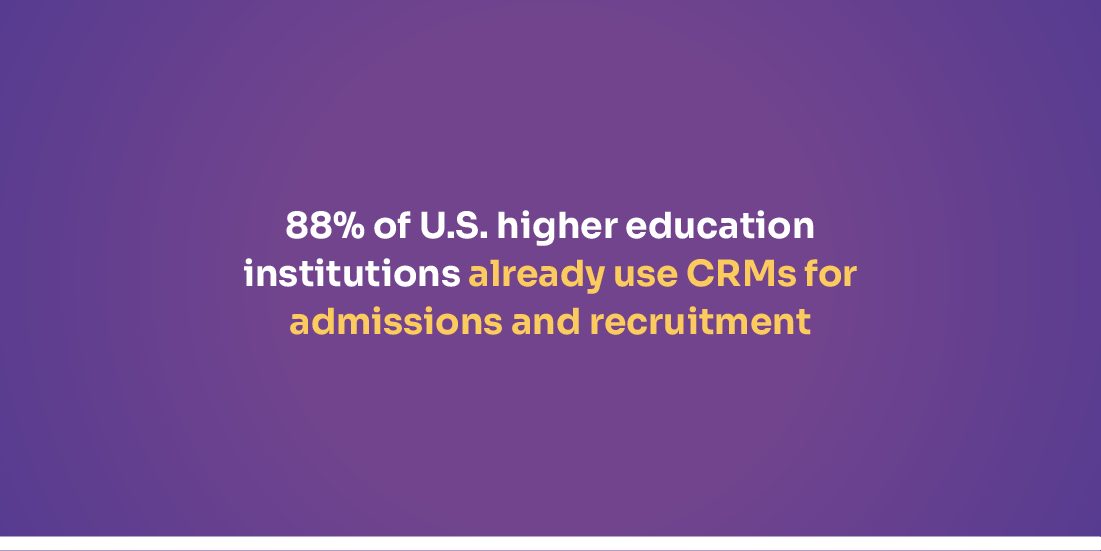
Top CRM Platforms to Boost Student Enrollment
Choosing the right CRM can make a big difference in how effectively an institution attracts and converts prospective students. Here’s a look at the top CRM solutions designed to drive enrollment growth.
Willo
Willo is an asynchronous video interviewing tool that helps higher education institutions simplify recruitment. It lets applicants record interview responses at their convenience, making the process less stressful for candidates while saving time for admissions teams.
Key Features
- Asynchronous interviews – Create effective interview formats without the need for real-time sessions.
- Custom question settings – Choose from various question types, control thinking time, allow retakes, and more.
- AI-powered question generator – Receive tailored suggestions based on department, school, and academic level.
- Scorecards – Standardize evaluations with a shared set of review criteria.
- Integrations – Connect with 5,000+ tools via Zapier for seamless admissions and marketing workflows.
Pricing
Paid plans start at $249/month for 5 open positions and $399/month for 10 open positions. Custom pricing is available for high-volume needs.
Pros
- Simple setup and user-friendly
- Cost-effective plans
- Scalable for institutions of all sizes
- Strong customer support
- Integrates with 5,000+ apps
Cons
- May not connect with all Student Information Systems (SIS)
Ellucian
Ellucian offers a comprehensive suite of solutions to enhance recruitment and admissions for higher education institutions.
Key Features
- Personalized communication – Engage prospects via email, SMS, and social media.
- Workflow automation – Automate application processing and follow-ups to reduce workload.
- System integrations – Connect with ERP, SIS, and LMS platforms for a unified experience.
- Analytics and reporting – Track performance and make informed, data-driven decisions.
Pricing
Available on request.
Pros
- Tailored for higher education needs
- Highly customizable
- Robust analytics tools
- Strong integration capabilities
Cons
- Requires significant training
- Can be expensive for small institutions
- Needs dedicated IT resources
Creatrix Campus
Creatrix Campus is an all-in-one platform for recruitment, assessment, and curriculum management, offering advanced integrations and customizable workflows.
Key Features
- Applicant Tracking System (ATS) – Manage the complete candidate journey from application to onboarding.
- Analytics and reporting – Track sources, performance, and success rates.
- Integration capabilities – Sync with existing systems for smooth operations.
- Custom workflows – Automate tasks, alerts, and recruitment processes.
Pricing
Available on request.
Pros
- User-friendly design
- Comprehensive management tools
- Strong support and training
Cons
- Setup can be complex
- Higher costs for smaller institutions
- Limited financial management features
LeadSquared
LeadSquared is a CRM platform built to optimize student recruitment through automation and lead management tools.
Key Features
- Automated workflows – Streamline communication and follow-ups.
- Analytics – Track application completion rates and campaign results.
- Integrations – Connect SIS, CRM, and communication platforms.
- Segmentation – Personalize outreach based on demographics and applicant behavior.
Pricing
LeadSquared CRM offers two plans — Sales Pro at $25 per user/month and Sales Super at $50 per user/month, making it a flexible option for different business needs.
Pros
- Strong automation features
- Responsive customer support
- Flexible customization
- Effective lead tracking
Cons
- Occasional technical issues reported
- Requires ongoing training
- Limited integration options compared to some competitors
TargetX
TargetX, built on Salesforce, is a CRM designed to improve recruitment and retention for higher education institutions.
Key Features
- Mobile-friendly applications – Submit from any device with internet access.
- Automated workflows – Assign staff, route applications, and send notifications automatically.
- Integrated communications – Use email, SMS, and chat without leaving the platform.
- Student portal – Provide real-time application status, document submission, and engagement features.
Pricing
TargetX follows a subscription model starting at $500/month for up to 100 users, with extra charges for additional users.
Pros
- Intuitive dashboards
- Strong email tools
- Highly scalable
Cons
- Expensive for smaller institutions
- Requires ongoing user training
- Reporting interface could be more intuitive
HubSpot
HubSpot offers customizable solutions for educational institutions to manage recruitment, track engagement, and nurture donor relationships.
Key Features
- Personalized recruitment experiences – Create landing pages, forms, and emails tailored to prospective students.
- Engagement tracking – Monitor student interactions with your content and resources.
- Donor management – Build and maintain relationships with alumni and sponsors.
- Integrated marketing tools – Manage email, social media, and advertising from one place.
Pricing
Ranges from free to $4,000+/month, depending on the number of users, product selection, and billing cycle.
Pros
- Excellent third-party integrations
- Built-in marketing and recruitment tools
- Detailed analytics and reporting
Cons
- High cost for larger-scale usage in education
- May include unused features in premium plans
CrmOne
CrmOne is an AI-powered CRM for higher education, equipped with its virtual assistant Aeri. It helps institutions manage student data, streamline communications, and enhance the overall student journey.
Key Features
- AI-powered student data management – Organize and securely share student information with designated team members.
- Automated communication – Engage students, parents, alumni, and partners via AI-driven bulk or scheduled emails.
- Marketing campaign management – Use AI tools to create and manage targeted student recruitment campaigns.
- Academic tracking – Monitor student progress, tuition payments, and offer personalized guidance.
- Custom learning experiences – Integrates with online platforms like YouTube, LMS, and social media for interactive learning.
- Parental transparency – Share progress reports and updates directly with parents.
Pricing
Available on request.
Pros
- AI assistant for automation and insights
- Supports multiple communication channels
- Customizable templates and integrations
- Beginner-friendly interface
Cons
- May require initial setup assistance for full integration
Slate
Slate is a centralized higher education CRM platform that streamlines application management, student data handling, and counselor-student collaboration. With the Slate + EdMo plugin, institutions can integrate enrollment marketing operations directly into the CRM, enabling seamless campaign tracking and personalized outreach.
Key Features
- Application management – Track and visualize application statuses in real time.
- Advanced document handling – Upload and manage transcripts and other documents in bulk or individually.
- Data privacy – Strong policies to protect student information.
- User-friendly design – Simple interface for both staff and students.
Pricing
Slate pricing starts at $30,000 per year, offering a comprehensive admissions and enrollment management platform designed for higher education institutions.
Pros
- Excellent data privacy measures
- Bulk document handling
- Easy-to-use platform
Cons
- May lack some marketing automation tools
Blackbaud
Blackbaud is a cloud-based CRM designed specifically for educational institutions, helping them manage the entire student journey from inquiry to alumni engagement.
Key Features
- Custom inquiry & application processes – Tailor admissions workflows to your institution.
- Advisor-student relationship tools – Build engagement through online communities.
- Direct marketing analytics – Improve campaign performance with data insights.
- Parent and student portals – Easy access to updates and communications.
Pricing
Available on request.
Pros
- Strong analytics and engagement tools
- Good customer support responsiveness
- Comprehensive lifecycle management
Cons
- Some outdated features reported
- Learning curve for certain tools
Embark Campus
Embark Campus is a higher education CRM platform designed to streamline the admissions process through collaborative application reviews, allowing multiple stakeholders to evaluate and comment on applications in real time.
Key Features
- Collaborative review tools – Allow multiple stakeholders to evaluate applications.
- Integrated communication – Send personalized or automated messages to prospects.
- Data analytics – Monitor application pipeline and conversion rates.
Pricing
Available on request.
Pros
- Strong teamwork capabilities
- Effective automated follow-ups
- Detailed admissions reporting
Cons
- Limited integrations compared to larger platforms
Element451
Element451 is an AI-powered CRM built specifically for higher education, designed to boost staff productivity and improve student engagement throughout the enrollment journey.
Key Features
- Bolt AI assistants – Provide virtual help for both students and staff.
- StudentHub – Centralized portal for tasks, events, and resources.
- Data insights – Use Bolt Discovery and Bolt Insights for search and analytics.
Pricing
Element451 costs $20,000 per year, providing an AI-powered CRM platform designed to streamline student recruitment, engagement, and enrollment processes.
Pros
- Dual AI support for students and staff
- Centralized student engagement hub
- Highly personalized experience
Cons
- May require onboarding for optimal use
NetSuite CRM
NetSuite CRM is a comprehensive platform that not only unifies customer and prospect data across departments but also integrates seamlessly with its powerful ERP and financial management tools.
Key Features
- Department-wide integration – Break down silos and consolidate systems.
- Real-time financial management – Track budgets, forecasts, and expenses.
- Fundraising and donor management – Automate the donation cycle.
Pricing
Available on request.
Pros
- Strong financial tracking tools
- Streamlined multi-department integration
- Scalable for large institutions
Cons
- May be complex for small institutions
Zoho Bigin
Zoho Bigin is a lightweight, easy-to-use CRM tailored for education relationship management, helping institutions track student inquiries, manage admissions pipelines, and streamline communication.
Key Features
- Custom stakeholder portals – Secure access for students, educators, and parents.
- Zia AI assistant – Provides insights, call transcription, and contact suggestions.
- Admissions automation – Streamline application processes and lead nurturing.
Pricing
Bigin by Zoho offers plans from Free for single users to Bigin 360 at ₹1,080/user/month, scaling from basic CRM tools to advanced automation, integrations, and 1M record capacity.
Pros
- Affordable CRM option
- AI-driven recommendations
- Customizable portals
Cons
- May lack advanced marketing features
Creatio
Creatio is a no-code CRM platform that lets institutions fully customize workflows for admissions, student engagement, and alumni relations without heavy IT involvement.
Key Features
- No-code automation – Build and adapt processes with drag-and-drop tools.
- Multi-department modules – Marketing, sales, and support in one platform.
- Creatio Copilot – AI assistant for customization and workflow automation.
Pricing
Creatio pricing starts with Growth at $25/user/month for SMB automation, Enterprise at $55 for full-scale corporate needs, and Unlimited at $85 for advanced enterprise automation.
Pros
- Highly customizable
- 700+ integrations
- Beginner-friendly interface
Cons
- Can feel overwhelming at first due to many features
Salesforce Education Cloud
Salesforce Education Cloud unifies student data and communications to enhance recruitment, retention, and alumni engagement, offering a 360° view of each learner’s journey. With powerful automation, analytics, and the EDMO plugin for personalized outreach, institutions can streamline operations, deliver tailored experiences, and drive measurable enrollment growth.
Key Features
- Student journey tracking – Monitor progress from inquiry to graduation.
- At-risk student alerts – Identify and support struggling students.
- Alumni engagement tools – Maintain post-graduation relationships.
Pricing
Salesforce Education Cloud starts at $87/user/month, with advanced Unlimited at $145 and AI-powered Agentforce 1 editions at $375/user/month.
Pros
- Highly customizable
- Strong analytics and personalization
- Alumni relationship focus
Cons
- Can be expensive for small institutions
Read more: Enrollment Tools: Best Student Enrollment Management Software & Systems
How to Get the Most from Your Student Recruitment CRM
A student admission CRM can transform how institutions manage recruitment and enrollment, making processes faster, more transparent, and personalized. Here’s how to use its features for maximum impact:
Centralize All Inquiries and Eliminate Confusion
Many institutions still juggle spreadsheets, emails, WhatsApp messages, and paper registers, often leading to missed inquiries or duplicate calls. A CRM consolidates website forms, WhatsApp, and partner leads into a single dashboard. This allows admissions teams to see every inquiry, its source, and the assigned counselor instantly.
Benefits:
- No lost leads or duplicate calls.
- More time spent interacting with students rather than searching for information.
- Complete visibility into each student’s journey.
Institutions using CRM solutions report a 30% improvement in response times to inquiries.
Respond to Students Instantly
Admissions is time-sensitive, and delays can result in lost opportunities. CRM automation ensures students receive immediate acknowledgment of their inquiries, even when counselors are busy.
Benefits:
- Every student gets a prompt, professional response.
- Enhanced institute reputation.
- Counselors can focus on quality conversations instead of chasing missed calls.
Personalize Every Interaction
Students expect communication tailored to their needs. A CRM enables personalized updates, including program details, deadlines, and document submission reminders, sent via the student’s preferred channels.
Benefits:
- Students feel guided and supported rather than spammed.
- Faster application progress.
- Reduced repetitive work for counselors.
87% of students said personalized communication influenced their college decisions, while poor communication led nearly half to reject institutions.
Simplify Applications and Document Submission
Complex forms and document requirements can deter applicants. CRMs provide mobile-friendly applications and easy document upload processes, with automatic tracking and reminders for missing items.
Benefits:
- Higher application completion rates.
- Less paperwork for counselors.
- A modern and organized experience for students.
Focus on the Most Promising Leads
Without a system, counselors may waste time on uninterested prospects. CRM lead scoring highlights the most engaged students, allowing teams to prioritize high-potential applicants while maintaining outreach to others efficiently.
Benefits:
- Higher conversion rates.
- Reduced counselor burnout.
- Timely follow-ups for the right students.
Track What Works and Optimize Marketing Spend
A CRM provides analytics to reveal which marketing channels generate the best leads. This enables institutions to optimize campaigns and allocate budgets more effectively.
Benefits:
- Smarter, data-driven marketing decisions.
- Better ROI on recruitment campaigns.
- Real-time performance tracking.
Re-Engage Cold Leads Automatically
Automation allows institutions to reconnect with students who may have lost interest or become busy. Scheduled campaigns such as scholarship alerts, event invites, or check-ins can revive engagement and increase enrollments.
Benefits:
- More opportunities from existing leads.
- No manual follow-up required.
- Boost in final admissions numbers.
Re-engagement campaigns can deliver up to 10% higher conversion rates from inactive leads.
Make Admissions Easy for Students, Parents, and Staff
A CRM segments communications so students, parents, and staff receive relevant updates. Shared notes, notifications, and task assignments keep the team aligned and streamline collaboration.
Benefits:
- Clear, timely communication for all stakeholders.
- Better teamwork across departments.
- Stronger trust and reputation for your institution.
Read more: What is an Admission Management System?
Conclusion
Choosing the right student recruitment CRM is essential for institutions aiming to streamline processes, improve engagement, and boost enrollment. By leveraging these tools, colleges can efficiently manage inquiries, personalize communication, and focus on recruiting college students who are most likely to enroll. Investing in a robust CRM not only simplifies admissions workflows but also helps institutions make data-driven decisions, ensuring long-term growth and successful student recruitment.
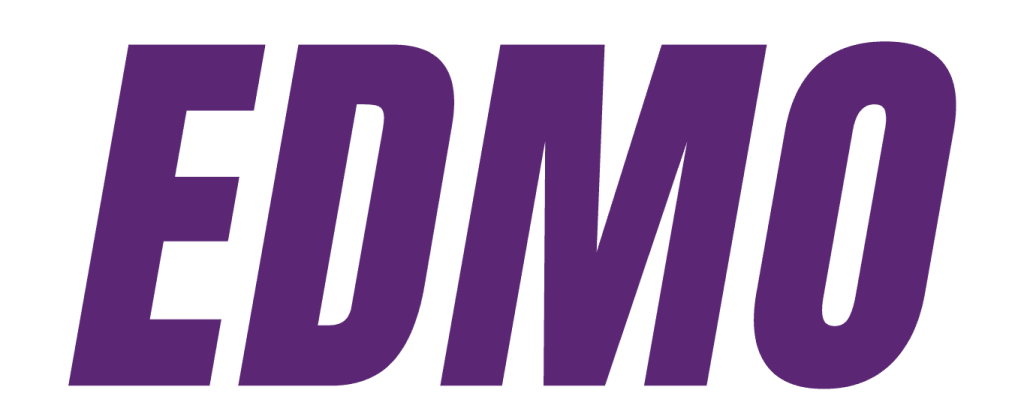

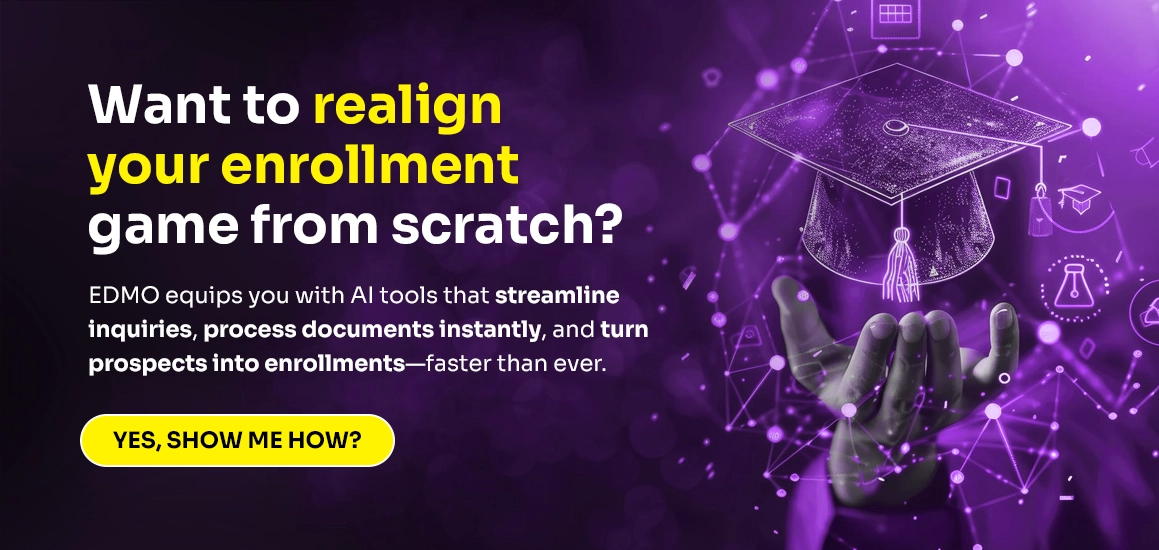





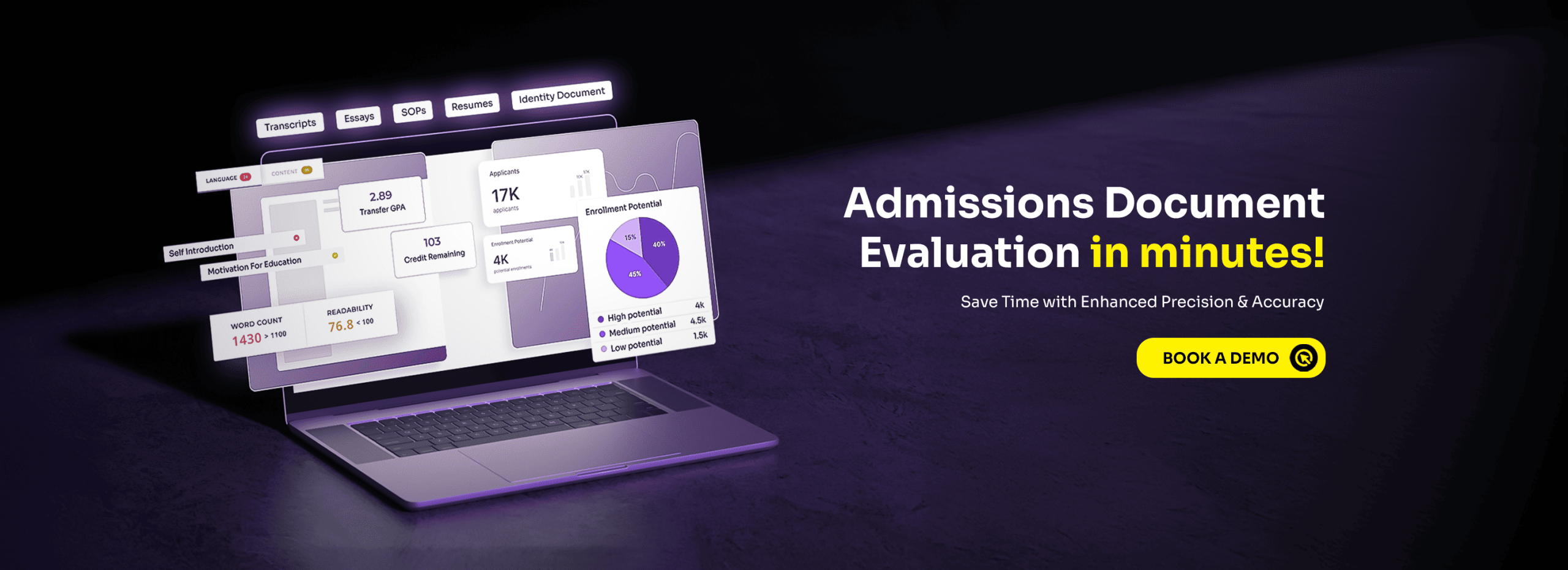
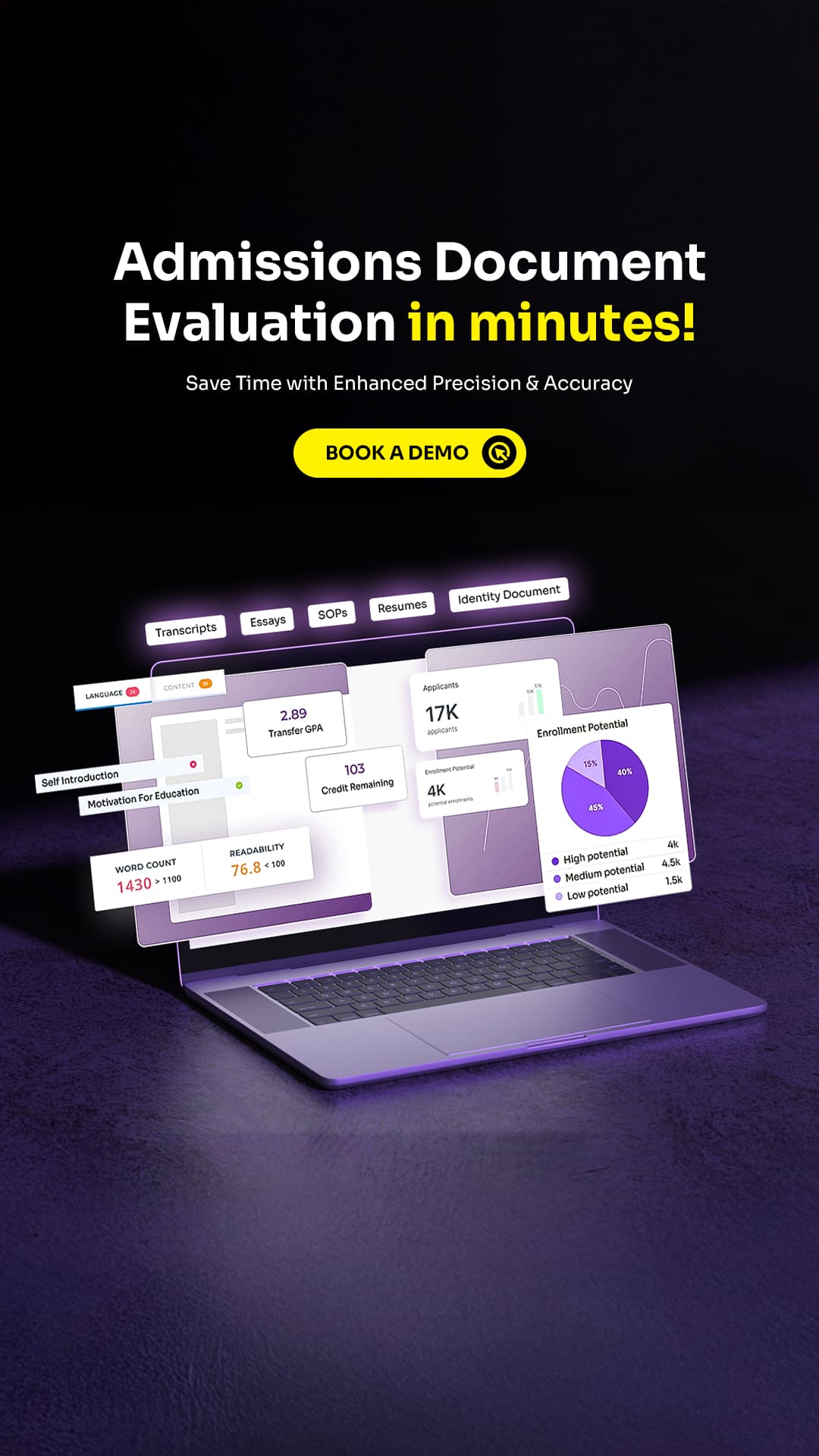
No comments yet. Be the first to comment!
Leave a Comment